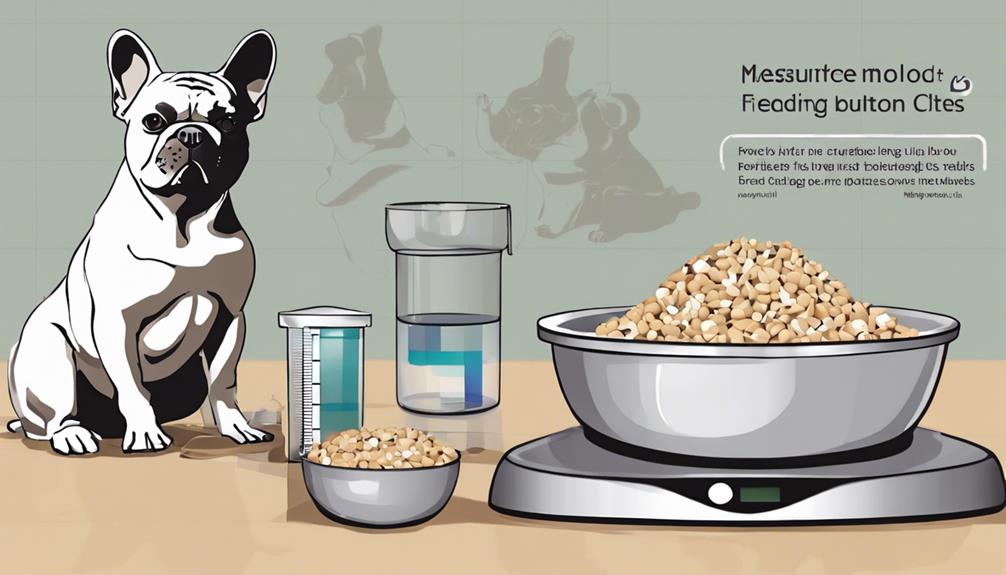Eight Essential Tips for Feeding Adopted French Bulldogs
When it comes to nourishing your adopted French Bulldog, think of their diet as the key to unlocking their best health potential. By following eight essential tips, you can ensure your furry companion thrives.
From understanding proper nutrition tailored to their needs to learning the art of portion control, these strategies are crucial for your Bulldog's well-being.
Unravel the mystery behind optimal feeding practices for your new four-legged family member and pave the way for a happy, healthy life together.
Proper Nutrition for French Bulldogs
When feeding your adopted French Bulldog, it's essential to provide proper nutrition to ensure their health and well-being. Weight management plays a crucial role in the overall health of your French Bulldog. These dogs are prone to obesity, which can lead to various health issues such as joint pain and respiratory problems. To maintain a healthy weight, it's important to feed your French Bulldog a balanced diet and monitor their food intake. Avoid overfeeding and limit treats to prevent excessive weight gain.
In addition to a balanced diet, nutritional supplements can also benefit your French Bulldog's health. Omega-3 fatty acids are particularly beneficial for their skin, coat, and joint health. These supplements can help reduce inflammation and improve overall well-being. However, it's essential to consult with your veterinarian before introducing any supplements to your French Bulldog's diet to ensure they're safe and appropriate for your pet.
Scheduled Feeding Times
Setting a consistent schedule for feeding your adopted French Bulldog is essential for their overall health and well-being. By establishing routine mealtime consistency, you're helping your furry friend maintain a healthy weight, digestive system, and behavior. French Bulldogs thrive on routine, so feeding them at the same times each day can provide a sense of security and predictability.
To ensure mealtime consistency, try to feed your French Bulldog at least twice a day, ideally in the morning and evening. This regular schedule can help prevent obesity and other health issues. Avoid leaving food out all day for free feeding, as French Bulldogs are prone to overeating and obesity.
When determining the best feeding times for your French Bulldog, consider your own schedule and lifestyle. Find times that work for both you and your pet so that you can consistently stick to the routine. Additionally, try to space out the meals evenly throughout the day to keep your French Bulldog satisfied and prevent excessive hunger.
Transitioning to New Food
To transition your adopted French Bulldog to new food successfully, gradually mix the new food with their current diet over a period of 7-10 days. This gradual introduction helps prevent digestive upsets and allows your furry friend to adjust to the new food without any issues.
Here are some transitioning tips to make the process smoother for your French Bulldog:
- Slow Transition: Start by mixing 25% of the new food with 75% of their current food for the first 2-3 days. Then, gradually increase the proportion of new food while decreasing the old food.
- Monitor Progress: Keep an eye on your French Bulldog's stool consistency and overall well-being during the transition period. If you notice any signs of digestive discomfort, slow down the transition process.
- Maintain Routine: Stick to your dog's regular feeding schedule to provide consistency during the transition. This helps your French Bulldog feel secure and comfortable with the gradual dietary changes.
- Patience is Key: Remember that every dog is unique, and some may take longer to adjust to new food than others. Be patient and allow your French Bulldog the time they need to adapt.
Monitoring Food Allergies
Wondering how to identify if your adopted French Bulldog has any food allergies? Monitoring your Frenchie for signs of food allergies is crucial for their well-being. Identifying triggers and conducting allergy testing can help pinpoint the specific ingredients causing adverse reactions.
Keep an eye out for common signs of food allergies in French Bulldogs, such as skin rashes, itchiness, ear infections, gastrointestinal issues like vomiting or diarrhea, and excessive flatulence. If you notice any of these symptoms, it's essential to consult your veterinarian promptly. Your vet may recommend allergy testing to determine which ingredients are causing the allergic reactions.
Allergy testing can be done through various methods, including blood tests or elimination diets. Blood tests can help identify specific allergens triggering reactions in your French Bulldog. Additionally, your vet may suggest an elimination diet, where potential allergens are removed from your Frenchie's food, and then gradually reintroduced to pinpoint the culprit.
Healthy Treat Options
For healthy treat options for your adopted French Bulldog, consider incorporating a mix of homemade snacks and vet-approved treats into their diet. When it comes to rewarding your Frenchie during training sessions, opt for treats that aren't only tasty but also beneficial for their health. Additionally, keeping an eye on their weight is crucial to ensure they remain in good shape and avoid any obesity-related health issues.
- Homemade Treats: By preparing snacks at home, you have full control over the ingredients, allowing you to cater to your French Bulldog's specific dietary needs.
- Vet-Approved Options: Consult with your vet to choose treats that aren't only delicious but also suitable for your Frenchie's overall health and well-being.
- Weight Management: Select treats that are low in calories to help with weight management and prevent your French Bulldog from gaining excess weight.
When using treats as training rewards, opt for small portions to prevent overfeeding. Remember that treats should only supplement their diet and not replace regular meals. With a balanced approach to treats, you can keep your adopted French Bulldog healthy and happy while reinforcing positive behaviors during training sessions.
Hydration Importance
Ensuring proper hydration for your adopted French Bulldog is essential for maintaining their overall health and well-being. Water intake plays a crucial role in keeping your furry friend healthy and happy. French Bulldogs can be prone to dehydration due to their short muzzles, making it important to monitor their hydration needs closely.
French Bulldogs should have access to fresh, clean water at all times. Monitor their water intake to ensure they're drinking an adequate amount based on their size and activity level. Dehydration can lead to serious health issues, so it's vital to encourage your French Bulldog to drink water regularly.
Signs of dehydration in French Bulldogs include dry gums, sunken eyes, lethargy, and loss of skin elasticity. If you notice any of these symptoms, encourage your pup to drink more water and consult your vet if the issue persists.
During hot weather or after physical activity, your French Bulldog's hydration needs may increase. Be mindful of providing extra water during these times to prevent dehydration. Proper hydration is key to supporting your French Bulldog's overall health and well-being, so make sure to prioritize their water intake to keep them happy and healthy.
Portion Control Techniques

How can you effectively manage the portion sizes for your adopted French Bulldog?
When it comes to feeding your furry friend, portion control is crucial for maintaining their health and well-being. Here are some tips to help you manage portion sizes effectively:
- Monitor Weight: Keep an eye on your French Bulldog's weight to ensure they're neither underweight nor overweight. Adjust portion sizes accordingly to promote healthy weight management.
- Consider Metabolism: French Bulldogs have a unique metabolism that can vary from dog to dog. Take into account your dog's activity level and metabolism when determining the appropriate portion sizes.
- Consult a Vet: A veterinarian can provide valuable insights into portion control techniques tailored to your French Bulldog's specific needs. They can offer guidance on weight management and metabolism regulation to ensure your furry friend stays healthy and happy.
Consulting a Vet for Guidance
Considering your French Bulldog's unique needs, consulting a vet can provide tailored guidance on effective portion control techniques to maintain their health and well-being. Vets can offer personalized feeding guidelines based on your Frenchie's age, activity level, and any specific dietary restrictions they may have. This professional advice can help you determine the right balance of nutrients and caloric intake to keep your pup at a healthy weight.
When consulting a vet for guidance on feeding your adopted French Bulldog, it's essential to discuss weight management strategies. Vets can recommend portion sizes and meal frequencies that support your dog's weight goals. If your Frenchie needs to shed some pounds, the vet may suggest specific dietary supplements or adjustments to their feeding routine to aid in weight loss.
Moreover, vets can provide valuable insights into dietary supplements that may benefit your French Bulldog's overall health. Whether it's recommending supplements to support joint health, skin, or coat condition, your vet can guide you on incorporating these supplements safely into your Frenchie's diet.
Frequently Asked Questions
Can French Bulldogs Safely Eat Raw Food Diets?
Yes, French Bulldogs can eat raw food diets, but be cautious about raw food risks. Their digestion may not handle raw foods well, leading to potential issues. Introduce raw foods slowly to monitor their reaction.
Over time, evaluate if this diet suits your Frenchie's needs. Always consult with your vet for guidance on transitioning to a raw food diet and ensuring your pup's nutritional requirements are met.
How Do I Know if My Adopted French Bulldog Has Specific Dietary Preferences or Aversions?
To figure out your adopted French Bulldog's dietary preferences or aversions, pay attention to behavioral indicators. Watch how they react to different foods. Some pups may show preferences by eagerly eating certain foods or avoiding others.
If your Frenchie consistently avoids a particular type of food, they may have an aversion to it. Keep an eye on their reactions and adjust their diet accordingly to cater to their preferences.
Are There Any Common Food Allergies or Sensitivities That French Bulldogs May Have?
Common food sensitivities and allergies in French Bulldogs include grains, dairy, and certain proteins like chicken. It's essential to monitor your pup for any adverse reactions like itching, gastrointestinal issues, or ear infections.
Consult with a vet to determine your Frenchie's nutritional requirements and whether supplements are necessary. By being mindful of potential sensitivities, you can help keep your furry friend healthy and happy.
What Are Some Signs That My French Bulldog May Not Be Getting Enough Water?
If your French bulldog isn't getting enough water, watch out for signs like decreased water consumption, dry gums, lethargy, and dark urine. These symptoms could indicate dehydration, which is crucial for your pup's health and hydration levels.
It's essential to monitor your dog's water intake and ensure they've access to fresh water throughout the day to prevent any issues related to dehydration.
How Can I Prevent My French Bulldog From Becoming Overweight Due to Overfeeding or Unhealthy Treats?
To prevent your French Bulldog from becoming overweight due to overfeeding or unhealthy treats, focus on portion control and use training treats wisely. Incorporate exercise into their routine and offer healthy snacks instead of empty calories.
Conclusion
In conclusion, remember to prioritize proper nutrition, establish scheduled feeding times, and monitor your adopted French Bulldog's food allergies.
Offer healthy treat options, ensure adequate hydration, practice portion control, and consult a vet for guidance.
By following these essential tips, you can help keep your furry friend healthy and happy for years to come.
